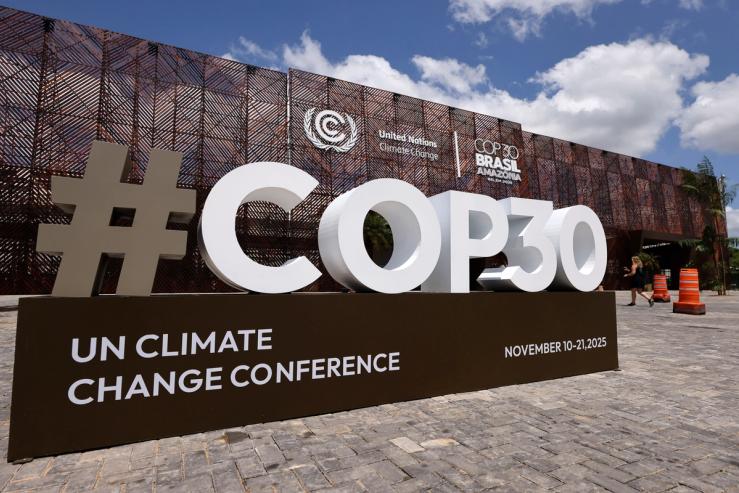The News
The oldest recurring fight at international climate summits — whether and how to cut oil and gas out of the global economy — is surfacing again at COP30, threatening to divide delegates on an issue that many thought was long resolved, but is in fact proving more contentious than ever.
Brazil, the summit host, is pushing countries to create a detailed plan for how to execute a landmark commitment adopted at COP28 in Dubai, for countries to “transition away from fossil fuels in energy systems, in a just, orderly and equitable manner.” President Luiz Inácio Lula da Silva called for such a plan in his opening remarks last week, and on Wednesday he gained several important new supporters, including Colombia, Denmark, France, Germany and the UK. The Colombian delegation is now circulating a draft “declaration on fossil fuels,” seen by Semafor, which asks signatories to “reaffirm our shared determination” to transition away from fossil fuels and to create a roadmap “to articulate and support transition efforts.”
But the nascent coalition is certain to face stiff opposition from Gulf countries and Russia, and possibly others reluctant to approve a document that would aim to eliminate the wiggle room inherent in the Dubai decision and constrain their ability to produce and use fossil fuels indefinitely.
In this article:
Tim’s view
The emerging fight in Belém underscores that as much as countries may be willing to collaborate on more abstract issues like climate adaptation, the fundamental problem of fossil fuels — the primary cause of climate change — remains a lightning rod at COP.
The Dubai agreement was a watershed in climate diplomacy because it was the first time that fossil fuels were explicitly identified in a COP decision and targeted for some form of reduction. But in the years since, as the war in Ukraine has scrambled energy markets and US President Donald Trump has pushed aggressively for a new age of fossil-based energy “dominance,” there is growing disagreement among global energy and climate leaders about what the Dubai language actually requires.
“The phrase ‘transitioning away from fossil fuels’ represents both an extraordinary breakthrough, and profound ambiguity,” said Arunabha Ghosh, a veteran climate researcher from India who is COP30’s special envoy for South Asia. “The language is open to interpretation, and a negotiated phrase is not the same as a shared pathway or a willingness to follow it.”
That has been increasingly evident in recent weeks. This month, Sultan Al-Jaber, the United Arab Emirates minister and executive who led COP28 and championed the “transition” agreement, told a gathering of fossil fuel executives that he expects total oil consumption to remain consistent for decades to come. But the International Energy Agency’s latest market outlook, released on Wednesday, makes clear that that level of consumption is not compatible with achieving net zero by 2050. (A spokesperson for ADNOC, of which Al-Jaber is group CEO, didn’t return a request for comment).
A more detailed “roadmap” of the kind proposed by Lula wouldn’t carry legal force. But it would put countries on the spot to either sign on, or admit that their own plans are out of step with a science-based view of what is required to reach the goals of the Paris Agreement, Michael Jacobs, a senior fellow at the think tank ODI and former senior climate official for the UK, told Semafor. Such roadmaps have been effective in other contexts, he said, including to induce policy changes at multilateral development banks, and the IEA’s new report already includes much of the basic data that a transition roadmap would require.
In a press conference Wednesday, COP30 President André Corrêa do Lago made clear that adopting a transition roadmap is not on the official COP agenda. Delegates and analysts told Semafor that he is in a delicate position, having to balance the stated desire of his own president against the need for diplomatic consensus on a wide range of other issues that could be destabilized by a high-profile fight over fossil fuels. But it’s not clear that a consensus is necessarily required; since the “transition” language is already on the books, it may be possible to kick off a roadmap without any new COP-wide agreements. That remains to be seen in the next week.
While the last thing that COP needs is another report, it may not be possible to deliver tangible progress on emissions reductions, or for the entire process to retain credibility with the public, without one, said Irene Vélez, Colombia’s acting environment minister. “We’re still dealing with denialism in climate politics about the causes of climate change,” she said. “With so many meetings and speeches, not enough has materialized, which makes for a crisis of multilateralism. That’s something we need to overcome.”
Room for Disagreement
It’s unlikely the IEA would want to form a closer alliance with the UN by collaborating on a fossil fuel transition report, given that it is already under enormous pressure from the Trump administration for being, in the administration’s view, too sympathetic to climate activists and unrealistic about the long-term need for oil and gas. In a press conference Wednesday, IEA Executive Director Fatih Birol said Brazil hasn’t asked him to participate in any new studies of the transition.
Notable
As IEA forecasts increasingly roil energy markets and anger politicians and activists on all sides, Birol — the “world’s most boring man” — has suddenly become the most interesting person in every room he is in, The New York Times reports.


